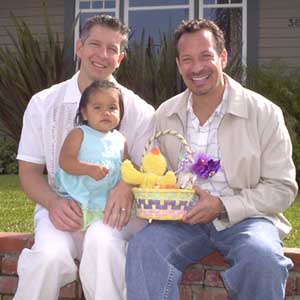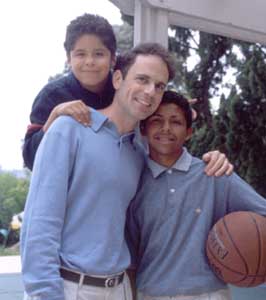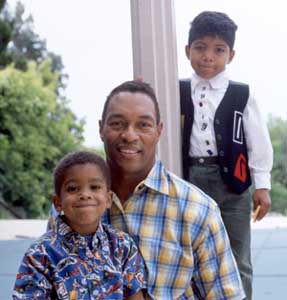-
- California Assembly approves landmark GLBT legislation
- Justice Department bars annual gay event, reverses decision
- ‘Gay Days’ unhampered by homophobes
- First openly gay Episcopalian bishop elected
- ACLU calls Montana higher education policy unconstitutional
- Coalition of Massachusetts clergy supports gay marriage
- Minister who married gay couples deemed blasphemous
- National News Briefs
- World News Briefs
feature
Fatherhood and family values
Gay couples find solace, growth through adoption
Published Thursday, 12-Jun-2003 in issue 807
When Scott Terry and Ted Persky met at a Memorial Day picnic in Washington, D.C., over a decade ago, neither dreamed that one day they would head a family of four boys — Alex, Emilio, Henry and Eric — just outside of San Diego. At the time, Terry was still in the military, working at the Pentagon, and Persky was enjoying his life and the couple’s newfound relationship.
“When Ted and I first got together I said, ‘I don’t want to have any children,” recalled Terry, now a consultant in equipment processing and program management. “We wanted to travel, we wanted to go to different places, do different things, eat and relax.”
However, Persky said it was Terry who ultimately started the couple down the path towards one of the most important decisions of their lives — adoption. The couple now trades nights on the town for helping with homework and movie rentals; happy hour has been replaced with science fairs, swimming lessons and basketball practice.
When the couple moved to San Diego in 1997 (they own a home in Tierrasanta), Terry began volunteering his services as a mentor with a group called Partners, growing attached to a 13-year-old boy who was without a mother and who had been in and out of the juvenile justice system (the couple is still close to the young man, now 18).
Terry’s mentorship cemented in him the desire to become a father. “Someone said to me, ‘Well if you can do that, then you would probably make a pretty good parent,’” he recalled.
A few years later, the couple contacted the County of San Diego and their two oldest sons, Emilio, 12, and Alex, 10, came to live with them in October of 2000.
“There’s a six-month placement in the home before you petition the court to adopt,” explained Persky. “They want to come once a month during those six months and make sure that you’re doing well, the kids are happy, you’re happy and everyone’s getting along.” Persky and Terry adopted the boys — who are brothers — in the spring of 2001.
The couple learned about the younger boys (another set of brothers), Henry, 6, and Eric, 4, through an adoption fair held at Six Flags Magic Mountain. Henry and Eric were placed with the couple last August.
“‘They’ve got two dads. They’ve got Playstation; they’ve got games. Man, it’s way cool.’” “It’s like having new roommates and new house rules,” said Persky of the couple’s decision to have a large family.
“New people all of a sudden invade your house,” added Terry. “You know, … ‘What do you serve for dinner?’ ‘What time is bed time?’ ‘Does macaroni and cheese work?’ You begin from there.”
Both Persky and Terry said their relatives were supportive of their decision to adopt, though none of them live in the San Diego area. For that reason, until recently the couple has relied on a nanny to help with homework, light cleaning and supervising the kids.
Asked how fatherhood has changed their lives, Terry laughs deeply.
“When we got off of work, our day was kind of winding down — we’d have a beer or maybe we’d go out or sit and watch the news and eat on TV trays,” explained Persky. “But now when you get home, your day is just starting. I really miss that late afternoon downtime. Now it’s like, I’ve got this homework; we’ve got a doctor’s appointment. So that time of day that’s … I’m at my lowest, [I have to be the most energetic].”
Asked about the reaction to their situation from school officials and friends, Terry responded, “The schools have been wonderful; principals, fabulous — just really supportive.” He says they have a stock answer for any of their sons’ friends who question why their family has two dads instead of a mom. “When the kids say, ‘We have two dads,’ [their friends] kind of evaluate and see what that means…. Some of the kids get to come over and they go, ‘They’ve got two dads. They’ve got Playstation; they’ve got games. Man, it’s way cool.’ And the kids usually defend our kids if there’s any, ‘How come you don’t have a mom?’ So it’s nice, because the kids get to see that they have a real average kind of a background. And that they have regular toys, regular problems and regular discipline.”
During the interview, one of the boys, Alex, wanders onto the backyard patio and asks Terry if he can go play basketball with a friend. Like any other dad, Terry first makes sure Alex has finished his homework, reminding him to stay in front of the house.
Terry says parents in the neighborhood are generally comfortable with the fact that they are a gay couple. “Movies, sleepovers, barbecues … kids come over and swim in the pool. We’ve had lessons conducted here,” he said. “The other parents bring their kids here and they all take lessons from the instructor that we provide.”
However, all parents face burnout eventually.
“Usually we call a babysitter,” said Terry, when asked how the couple manages to get in time for themselves. “Once in a while we will get one of our friends and say, ‘Hey, can you watch them for a couple of hours?’ But usually we don’t use our friends for that, just because we want to make sure they stay friends…. We let them participate, but not at their expense.”
Besides relying on others in the neighborhood to show them the parental ropes, Terry and Persky belong to Family Matters, San Diego’s gay and lesbian parenting organization.
“Family Matters has helped because other parents will get together and talk about new or alternative ways of parenting,” Terry explained. “How to relieve the stress? How do you combat the fatigue? How do you get more restful sleep? How to shop more productively? And how to just have fun together? Also, you get to have a discussion with another adult, which is a wonderful treat.”
In the recently released book Gay Dads (see page 43), author David Strah writes that in his interviews with gay fathers across the country, many fathers note that their gay friends distance themselves once children are brought into the equation.
“Once you have kids, your circle of friends changes because … you are aligned with other people that have children in their lives,” explained Terry. “So the people that don’t have children might not be as in the forefront. Your ability to be flexible and go out to dinner at a moment’s notice is not as present as it was before.”
Though Terry and Persky were ultimately motivated to make a difference in the lives of the children they adopted, they find their sons have added to their own growth. “They in turn make a wonderful difference in our lives,” Terry stressed. “We became much more introspective; we became much more focused on the quality of time we spend with each other and with them. You become more intense and more personable with yourself, and little things don’t take on the same magnitude anymore — now I just kind of blow things off. I don’t have to have all the shoes picked up and all the socks put away and toys put away.”
Jonathan Bailey and his partner Triton Klugh have been together for six years. They have a 17-month-old daughter, Sophia, and are in the process of adopting a second child.
“When you get home it’s a pleasure to have that little smiling face come running at you and holding her hands out yelling, ‘Daddy, Daddy!’ I just can’t tell you how my heart melts.” “On our second date we went to Coronado beach and had a picnic and Triton asked me how I felt about kids and family,” said Bailey. “He said that it was really important to him. I was enamored at the time, so of course I said, ‘Yeah, that’s a great idea.’ Then our relationship progressed and he kept talking about it and I realized that he was serious. So I did some soul searching and realized that I was [also] serious.”
However, after three or four years of mentally preparing themselves, Bailey and Klugh suffered a heartbreaking loss that Bailey likens to a miscarriage.
“To make a long story short, we got hooked up with a birth mother in Vista. She changed her mind and didn’t tell us, gave birth to the baby and left town. It was heartbreaking to say the least…. You could liken it to having a death. It was horrible, because we were hooked up with her for six months.”
However, the couple was so intent on having a child that the experience didn’t stop them from trying again. Going through an attorney in Beverly Hills, the couple found a birthmother after just once month — and Sophia was born soon after.
As Bailey recalled, his daughter’s birthmother was 17 years old and already had a two and a half-year-old son. Coming from a Latin family with strong, Catholic beliefs, Bailey said the girl’s parents would have made her keep the child had they known she was pregnant (though he still ponders how they couldn’t have known).
“She wanted very much to make a life for herself and for her son,” Bailey recalled. “She wanted to become a nurse and go to college. So, she hid it from [her parents]. Mind you, she lived with her mom and dad and her three younger siblings and her two-year-old son…. She wore baggy clothes and tried to conceal it, but she looked pregnant.”
After spending the day with the birthmother, Bailey and Klugh decided that they had found a good match.
“One night she called and said, ‘I’m going into labor, do you want to come meet me at the hospital?’ So we jumped in the car and drove up to Long Beach and … got to be in the room when Sophia was born. We didn’t know whether Sophia was going to be a boy or a girl,” said Bailey. “It was just the most incredible experience of my life — to see our daughter born and to hold her. The doctor handed her to me; I was the first one to hold her and then I handed her to Triton. Her birthmother didn’t even hold her — and was very strong, considering she was 17 years old. She said, ‘This is your baby and I don’t feel attached to this child as my own. I’m glad that I could do this for you.’ She had a lesbian cousin and so she didn’t have a problem with a same-sex couple adopting her child. She was just more interested in making sure that she was going to a loving home.
“The funny part of it is that as soon as she’d given birth, she started asking when she could go home,” Bailey continued. “The nurses said, ‘Well, gosh we have to keep you for 24 hours. We have to observe you and make sure everything is going okay.’ She said, ‘oh, no, no. I told my parents I was taking my son to Disneyland and they close at ten o’clock.’ So she literally checked herself out of the hospital against doctors orders and went home…. That was the last we saw of her.”
Though Bailey said he and his partner have “consistently argued” about how many children they would have, they ultimately knew they wanted to have a second child. “Triton would love to have four children, and I’m more, ‘Let’s see how two goes.’ But we both kind of came from big families…. So we’ll see….”
Bailey and Klugh are also members of Family Matters. “They’re a terrific source of information, not only for people with kids already, but for people who want to have kids,” said Bailey. “And we have met some really terrific friends through the process. We have a playgroup that we attend every month that rotates from house to house. It’s made up of gay parents and their children in roughly the same age group, so they can all play together…. It’s really been a good way for us to connect with other parents.”
As to how their circle of friends reacted to the adoption, Bailey said, “Our friends knew for a long time that we wanted to have kids, so they knew this was in our future. It was a matter of when. I would also say that some of our relationships have changed since we had kids…. The people that you used to go out clubbing with, you’re not hanging out with them as much. I mean our social lives are focused on our kid. Her bedtime is 8:00 and, you know, we’ve got to be home to give her her bath and feed her her dinner. So, there are not a lot of fancy dinners at the W at 10:00 at night. It just doesn’t happen as much anymore…. And everybody’s understanding of that.”
Bailey said the couple now tends to gravitate towards other people with children. “It’s a common bond, a shared experience,” he said. “You’re hungry for information about how you can be a better parent and how your kid can have a better experience growing up. We learn from one another. Whether they’re gay parents or straight parents.”
Though the couple also uses a nanny to help them care for their daughter, Bailey doesn’t consider parenting a chore.
“You know, it’s not work. When you get home it’s a pleasure to have that little smiling face come running at you and holding her hands out yelling, ‘Daddy, Daddy!’ I just can’t tell you how my heart melts. Everything from my bad day at work absolutely just melts away and it’s all about her — and that’s a very welcome and wonderful feeling.”
Bailey also said he felt the experience had added to his own development as a human being. “Oh, my gosh, yeah. You should talk to my friends, who say, ‘Jon, you’ve changed so much since Sophia came into your life and I see so much more depth and different parts of you than before.’ It just opens up a whole new part of you. The easiest way that I can describe it is that it’s refreshing and wonderful for me to be able to think about somebody other than myself. Everything is focused on my family — Triton and my daughter.”
However, there are added challenges a parent faces when dealing with the interpersonal dynamics between multiple children, as Terry testifies. “One of the hardest things is finding time to nourish and develop their own individual personalities. Each of them is very, very individual, very distinct [and] has a very focused opinion about how the world works. Finding the time to work with each child individually is one of the hardest challenges. It’s something that we work on every week.”
Asked if being raised by a gay couple has had an affect on his sons’ worldviews, Terry said yes. “It has, and we don’t brush anything under the rug. We want them to understand that everybody doesn’t look like everybody else. There are a variety of combinations of men and women, men and men, women and women, single men, single women. There are different hues and colors of people, and each of them has something to offer and each of them has something of value.”
On the subject of diversity, Terry addresses the diversity in his own family.
“There are some 50,000 kids in the state of California that are looking for homes,” he noted. “People don’t want older, non-white kids. So if you’re older than three and you’re not white, and you’re a boy, your chances are greatly reduced for being adopted. So my partner and I thought that since I’m black and he’s white we would get kids that were representative of us having been together. So the fact that we have Latino [and African-American] kids is kind of middle of the road. Not that we have any bias one way or the other, it just kind of turned out that way.”
|
|
Copyright © 2003-2025 Uptown Publications





